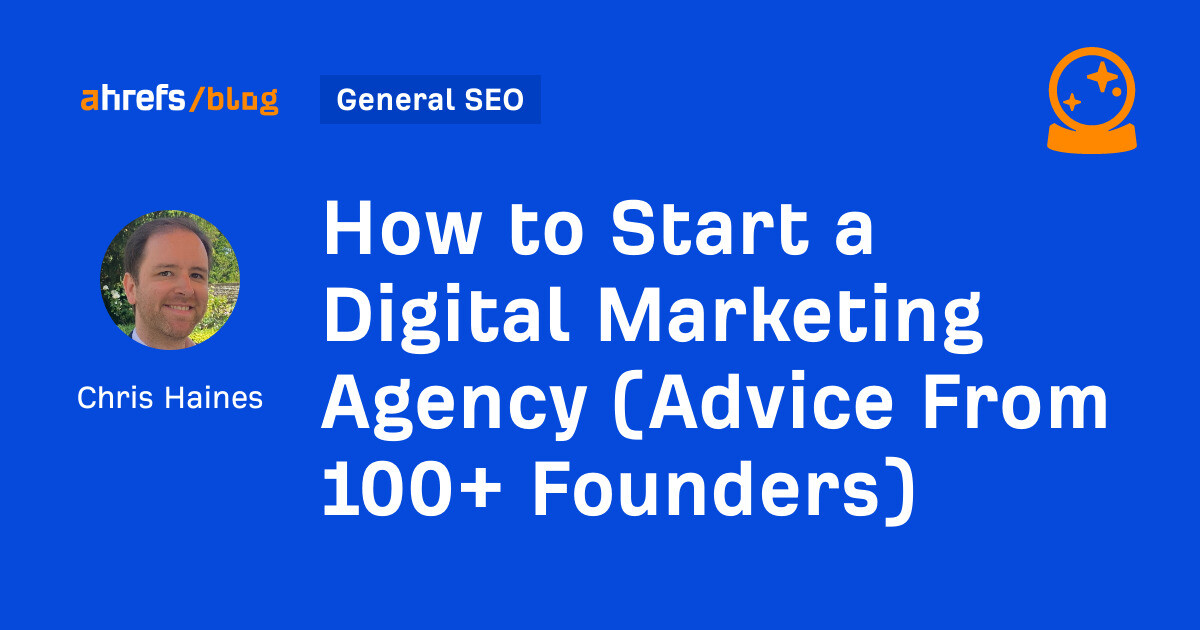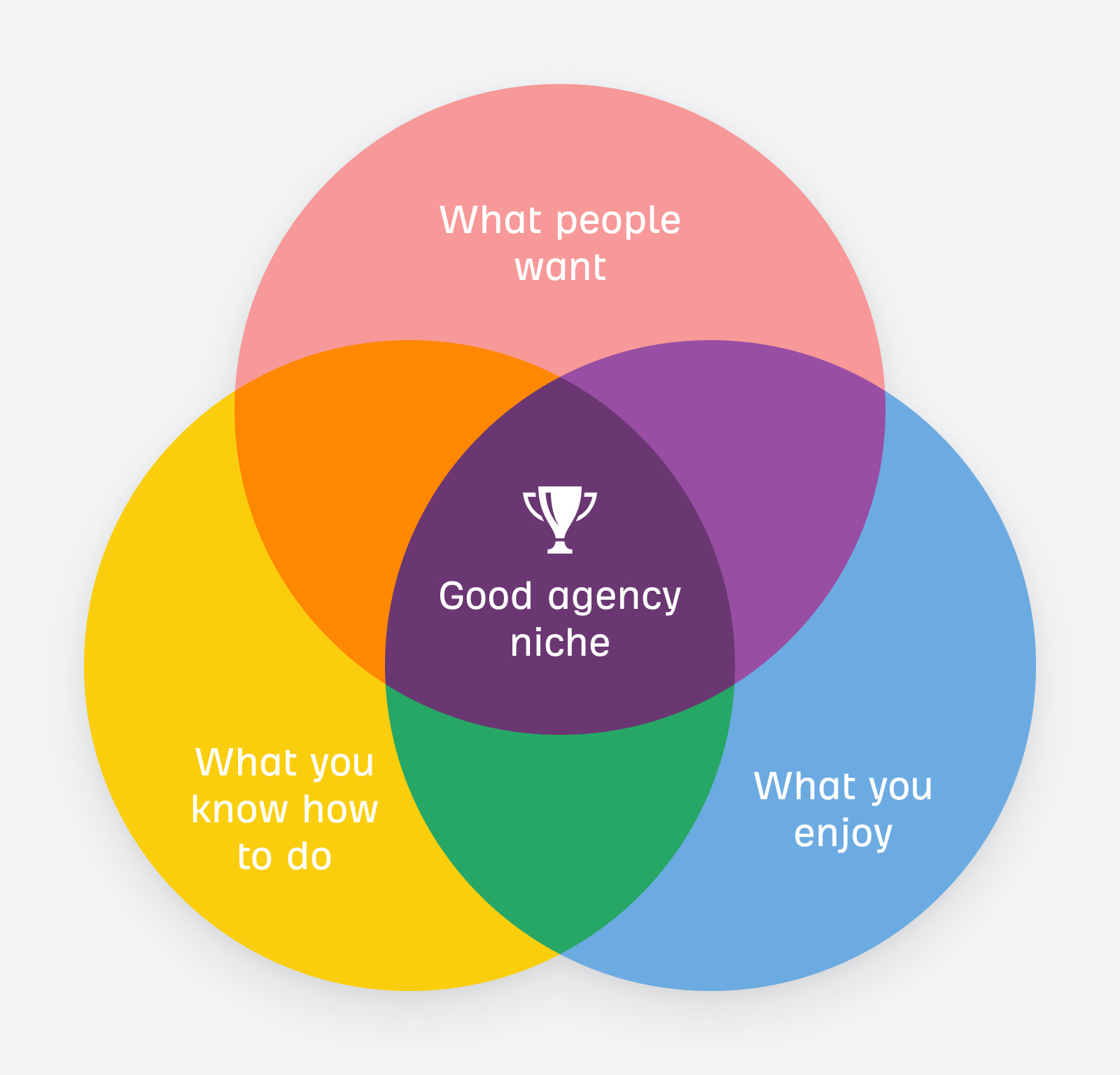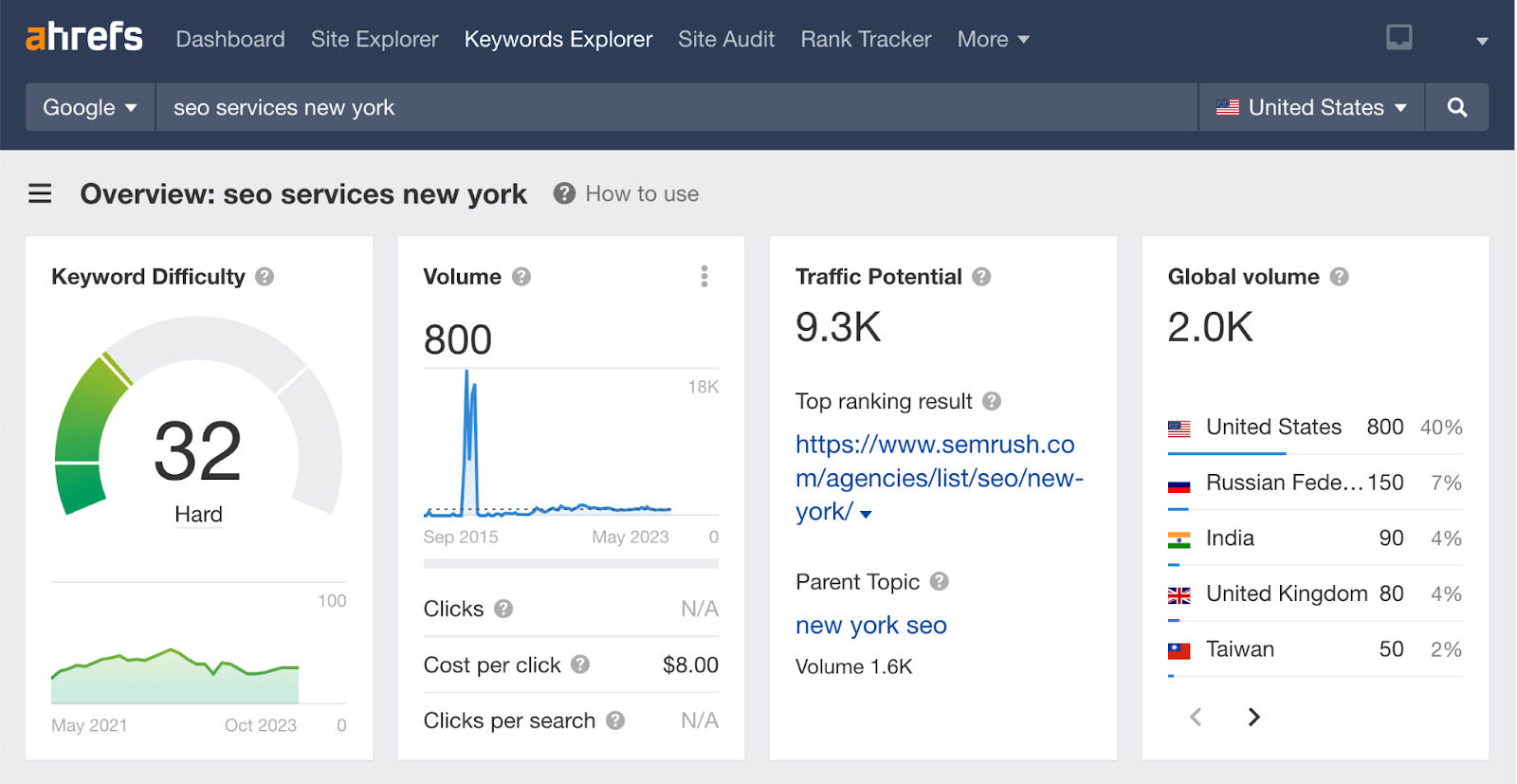SEO
How to Start a Digital Marketing Agency (Advice From 100+ Founders)

Here’s how they started their agencies—and you can too.
Choosing what your agency focuses on should be a mix of what people want, what you know how to do (and are good at), and what you enjoy.
“I’m a big believer in only selling something you’re good at.”
Here’s what this looks like visualized:

Although finding a good agency niche isn’t a guaranteed recipe for success—it’s often the best place to start.
Tip


“I learned pretty early on that it is fruitless to try and offer SEO services to anyone and everyone, and you should either specialize in what you offer (e.g., link building or site audits) and who you offer it to (e.g., SaaS companies, eCommerce stores or people in the finance space) So it’s something I would have done differently from day one, and it’s what I would follow today if I was starting from zero.”
Based on Glen’s advice, to start your digital marketing agency, you’ll need to do two things:
- Work out what to sell
- Work out who to sell to
When starting a digital marketing agency, you’ll need to decide on the types of digital marketing services you want to sell.
In my opinion, it’s best to start by focusing on providing one single service (and doing it really well) you can always expand your offering later on.
Here are a few examples of popular digital marketing services you could sell:
As there are so many services that are classified as digital marketing, it’s tempting to say “yes” to every piece of work available when you start out—even if you aren’t an expert in it.
Agency founders told me that they learned the hard way that being the “one-stop shop” for all digital marketing services wasn’t always a good idea, as it watered down their expertise and message.
Most founders I spoke to agreed that it was best to focus on providing one service, especially when starting out—and that included Nathan Gotch:
“I’d focus on one market segment instead of building a catch-all agency.”
Once you’ve worked out what to sell, you’ll need to work out who to sell to.
Here’s some ideas for who you can sell to:
- Specific professions or industries – e.g., Dentists
- Customers in a particular location – e.g., Florida
- A combination of the two – e.g., Dentists in Florida
Identifying the industries or businesses interested in your services allows you to tailor your service and marketing strategies to resonate with your potential clients.
By focusing on specific markets, you can show the client that you are the expert in that area.
When you start your digital marketing agency, chances are you won’t have clients fighting their way to your door to work with you, so you’ll probably have to go and find them. But how do you do this?
Many agency founders I spoke to suggested that the more you specialize, the easier it is to become recognized as the expert for that particular service, meaning the clients naturally come to you.
So how can you specialize?
- Specialize in the types of services you provide – You can also specialize in providing a certain type of service for your clients. For example, if you can land high-quality links with a high success rate, then you could specialize in providing digital PR services
- Specialize in the types of businesses you work with – Only work with certain types of businesses. For example, you could choose to specialize in providing digital marketing for SaaS businesses, or you could specialize by only working with businesses from a certain location.
- Do both – You can take both the concepts above and become the expert at providing services for a certain type of business. For example, you could become the go-to agency for digital PR for fashion ecommerce stores
The downside of specialization is that it’s inevitable that you’ll have to turn down business opportunities. But in the long term, it can help carve out your agency’s reputation as the go-to provider for a certain audience, a certain service, or both.
One of my favorite quotes on this topic is from agency founder Amanda Sexton:
“Specialization does not just establish you as a consummate expert in a designated field. It acts as a magnet.”
Getting your first client is the hardest part of starting an agency. When I asked for advice, “use your network” is what agency owners told me time and time again. It sounds obvious, but it’s one of the most overlooked ways to find clients.
It can be as simple as talking to friends, family, colleagues, or anyone else you know and asking if they would be interested in your services or know anyone who would.
If you’ve exhausted your real-world connections, you can turn to social media to amplify your message further, as Liam Quirk did:
“LinkedIn and Instagram are valuable platforms to showcase expertise. I began by posting SEO case studies on LinkedIn, demonstrating our results and capabilities. This not only built my personal brand but also attracted potential clients who were seeking SEO services.”
And, as the name of the game is just to get noticed—anything that can help you do that is worthwhile. For example, Brendan Hufford started a 100-day project to get his name out there and get noticed:
“Starting out, it was just about getting my name out there. For example, I did a 100-day project where I published a blog, podcast episode, and YouTube video every day for 100 days (Ahrefs was a sponsor!)”
“Talk to local businesses” was another widely shared tip from agency founders.
It’s one of the most straightforward ways to find your first few clients. The benefit of doing business locally is that it’s generally less competitive, and you’re already likely to have knowledge of the local market and businesses.
Agency owners who focused on local businesses found that it was a good way to start out and distinguish themselves from other bigger, more established agencies.
“We specifically focused on the Wisconsin market as we started. This helped set us apart with our commitment to our local businesses.”
If you’ve exhausted your network and it’s not getting the leads you want, it’s worth casting your net wider by getting some work on freelance sites.
Here are a few examples of websites you can use to advertise your services:
As well as getting work on freelance sites, agency founders told me that they got work in social media communities, like Facebook groups.
“I started as a freelance SEO expert before starting an agency. I decided to go with the agency model after getting some clients and experience managing SEO clients. I got my first SEO client (as an SEO freelancer) from a Facebook group. I shared my keyword research guide there.”
The more work that you complete, the more you’ll start to build up your reputation, which will help you get more clients.
Cold calling and emailing have a bad reputation, but if you are starting out, it’s worth giving it a try. If you get your pitch right, it can kick start your agency, as it did for Joshua George, who got his first 20 clients through cold email using this method:
“We used to search for a keyword in Google, and we’d go from page 2 to page 7 of Google, find their names and email addresses, and send them an email.”
To get the most out of cold emailing and calling, it’s best to research your prospects beforehand and personalize your pitch to them. Joshua did this by following up with a personalized video afterward.
Once you’ve established your agency and got a few clients, founders told me their most valuable leads came from referrals from other partner agencies.
“We work with web development agencies, design agencies, and a paid advertising agency that all have clients that may need our services. These are the best types of leads because we have come highly recommended, and there’s usually very little, if any, competition for the work.”
If you want to start partnering with other agencies, a good place to start is by networking with the people who run them.
You can do this by:
- Searching for meetups in your area that interest you
- Following other agencies on LinkedIn and start engaging with their content
- Arrange video calls with other agency founders
Getting referrals from other agencies is one of the most effective ways to get clients—because there are usually no other agencies pitching for the same work, meaning less competition.
Another advantage of getting business this way is you don’t have the time-consuming procedure of pitching for the business, as you already come highly recommended.
Once you’ve identified potential clients, you’ll need to convince them to purchase your services—this is often easier said than done.
Here’s how you should approach this once you’ve found potential clients.
- Start by showing value, e.g., For SEO services, provide a video of their site’s current SEO issues and how to fix them
- Provide a solution through your agency’s services, e.g., For SEO, propose an initial SEO audit project
- Email the proposed roadmap, provide a forecast, and define the scope of the services you’ll be delivering to close the lead
Convincing clients to purchase your services gets easier as you build up your reputation, but it can take time.
Here are some things you can do to show the value of working with your agency early on.
Once you’ve got a few clients through the door, it’s time to start thinking about refining your service offering. One of the most critical elements of this is the pricing.
Price too low, you won’t be able to cover your costs. If you price too high, you may lose valuable clients—it’s a tricky balance.
Many of the agency founders that I spoke to said that they undervalued their services when they started out:
“Avoid offering rates lower than other similar agencies. You deserve the payment, clients anticipate certain costs, and reducing your prices can signal you’re unsure about the quality you deliver.”
Here’s how to get started: Your service pricing should be based on your total costs plus your margin.
The margin can be whatever percentage you want, but it needs to be realistic.
Digital marketing agencies have different pricing models, but the agencies I’ve worked at have used either the retainer or project-based pricing models. For instance, most SEO services are long-term and usually fit a retainer model for pricing, but an SEO audit might be more suited as a project.
Retainer pricing is where the client is charged a monthly fee for your services.
It’s one of the most common ways agencies charge their clients. The main reason is that it creates a predictable cash flow for the agency, which is useful as it enables you to plan for new hires and reinvestment back into the business.
Project-based pricing is where the client is charged per project. It’s useful for initial consultation and a good way for clients to “test” your services before entering into a retainer contract.
When I priced up projects in an agency setting, I would calculate the number of hours my team would take to complete the project multiplied by the hourly rate of the people doing the work. I would then add our agency’s margin to that figure.
Your agency’s reputation is dependent on the quality of the work that you put out. But unless you create templates, standard operating procedures (SOPs), and processes, you won’t be able to personally guarantee to clients when your agency expands that you can deliver what is required.
That’s why it’s a good idea to create SOPs and templates before you hire anyone else in the agency.
SOPs and templates ensure the following:
- Consistency – You can be sure that work is completed to a high standard that you define
- Efficiency – You can provide the most efficient method to complete the tasks
- Prioritization – Focusing on the important aspects of the service is crucial in order to retain your clients
When most people think of starting an agency, they imagine having their own office and having a team of full-time employees (FTEs) providing their digital marketing services, but the reality is that most agencies—including the really big ones—will use a mix of freelancers and FTEs to get the job done.
So, how do you start? It’s best to start with freelancers, as Matt Cayless suggests:
“We began with freelancers. This gave us flexibility and allowed us to scale our team according to the demand. However, as we grew and stabilized, we gradually transitioned to hiring full-time employees. My advice to new agency founders would be to assess your workload and growth trajectory.
While freelancers are great for flexibility and specific projects, full-time employees can be more invested in your company’s vision and growth. Also, as I’ve learned, don’t shy away from hiring top talent early on. Their expertise can fast-track your growth and save valuable time in the long run.”
FTEs and freelancers come with their own pros and cons.
- If you are looking for flexibility, then freelancers or working on a project basis freelancers would be the best fit
- If you want someone working 9-5 on a client retainer project, then you probably want to consider hiring an FTE
Another aspect to consider is that as your business grows and evolves, your demands (and perception of success) may change over time.
This is what Glen Allsopp realized:
“As I became more successful, I watched my mindset go from: ‘I want a huge team with amazing offices and dozens of staff,’ to ‘I want the smallest team I can possibly have’ where we all enjoy what we’re working on and work with dream clients.”
Finding the right people (and retaining talent) is usually just as tricky as getting clients. Even if you’re the world’s best digital marketer, it’s unsustainable to deliver the entire agency workload yourself, so you’ll need to delegate at some point.
Hiring your own team is crucial if you want to grow your agency, but it can be a delicate balance between success and failure, as agency founder Simon Schnieders pointed out:
“Hiring is literally the life and death of an agency. Over 50% of your costs will be labor. Over-hire, and you kill any margin, under-hire, and you kill your team and your customers. It’s a delicate balance.”
In my own experience, you need to look for people who would be a good fit for your team but, at the same time, have a hunger to learn and embrace change easily.
Approaches to hiring varied slightly from agency to agency—but I liked the simplicity of Joshua’s approach:
“Only hire someone that’s better than you at the role you’re hiring for.”
The same approach was also shared by Andy Barr at 10 Yetis.
Agencies often obsess with scaling quickly and hiring more people to establish themselves in the market, but hiring more people before the company’s ready could mean you commit financial suicide—-and also, you may find that you just don’t enjoy it.
“I always know I could have scaled things further by bringing on more people, but I know I wouldn’t enjoy what I do even half as much.”
Final thoughts
Starting a digital marketing agency is not for the faint-hearted. You’ve got to have drive, commitment, and a love of the business. The trickiest part is there is no blueprint for success—every agency is different.
But, if you’re able to find a great niche, hire great people, and deliver exceptional results for your clients, there’s no reason why your agency can’t be a success.
Got more questions? Ping me on X. 🙂











![How AEO Will Impact Your Business's Google Visibility in 2026 Why Your Small Business’s Google Visibility in 2026 Depends on AEO [Webinar]](https://articles.entireweb.com/wp-content/uploads/2026/01/How-AEO-Will-Impact-Your-Businesss-Google-Visibility-in-2026-400x240.png)
![How AEO Will Impact Your Business's Google Visibility in 2026 Why Your Small Business’s Google Visibility in 2026 Depends on AEO [Webinar]](https://articles.entireweb.com/wp-content/uploads/2026/01/How-AEO-Will-Impact-Your-Businesss-Google-Visibility-in-2026-80x80.png)














